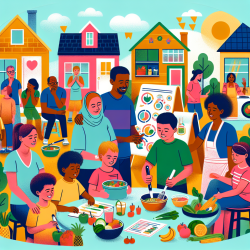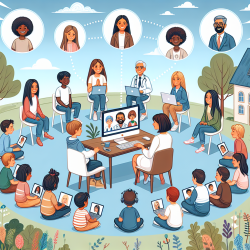Introduction
As a speech-language pathologist, the pursuit of improved outcomes for children is a driving force behind our practice. Data-driven decision-making is crucial in this endeavor, allowing us to tailor interventions based on empirical evidence. A recent study titled "A mixed-methods evaluation of community-based healthy kitchens as social enterprises for refugee women" provides valuable insights that can be translated into our field, particularly in enhancing the social and economic aspects of interventions.
Understanding the Study
The study conducted by Sahyoun et al. (2019) evaluated the impact of community-based healthy kitchens on refugee women's economic status, food security, decision-making, mental health, and social support. The intervention involved establishing kitchens as small business enterprises, linked to schools, where women were trained in food preparation, safety, and entrepreneurship. The results showed a 13% increase in household expenditure and improvements in food security and social bonds among participants.
Translating Findings to Speech Language Pathology
While the study focused on refugee women, the principles can be applied to speech-language pathology, particularly in school settings. Here are key takeaways for practitioners:
- Community Engagement: Just as the kitchens fostered social bonds, speech-language interventions can benefit from community involvement. Engaging parents, teachers, and peers can create a supportive environment for children.
- Economic Considerations: Understanding the economic context of families can help tailor interventions that are both feasible and sustainable. This aligns with the study's findings on improving economic outcomes through community-based models.
- Social Support: The social enterprise model provided a platform for women to share experiences and support each other. Similarly, group therapy sessions can enhance social skills and provide peer support for children.
Encouraging Further Research
The study underscores the potential of integrating economic and social components into health interventions. For speech-language pathologists, further research could explore the impact of community-based models on communication outcomes. Investigating how economic stability and social support influence language development could yield significant insights.
Conclusion
By leveraging the findings from community-based healthy kitchens, speech-language pathologists can enhance their practice through a holistic approach that considers economic and social factors. This not only aligns with data-driven decision-making but also fosters environments where children can thrive.
To read the original research paper, please follow this link: A mixed-methods evaluation of community-based healthy kitchens as social enterprises for refugee women.










